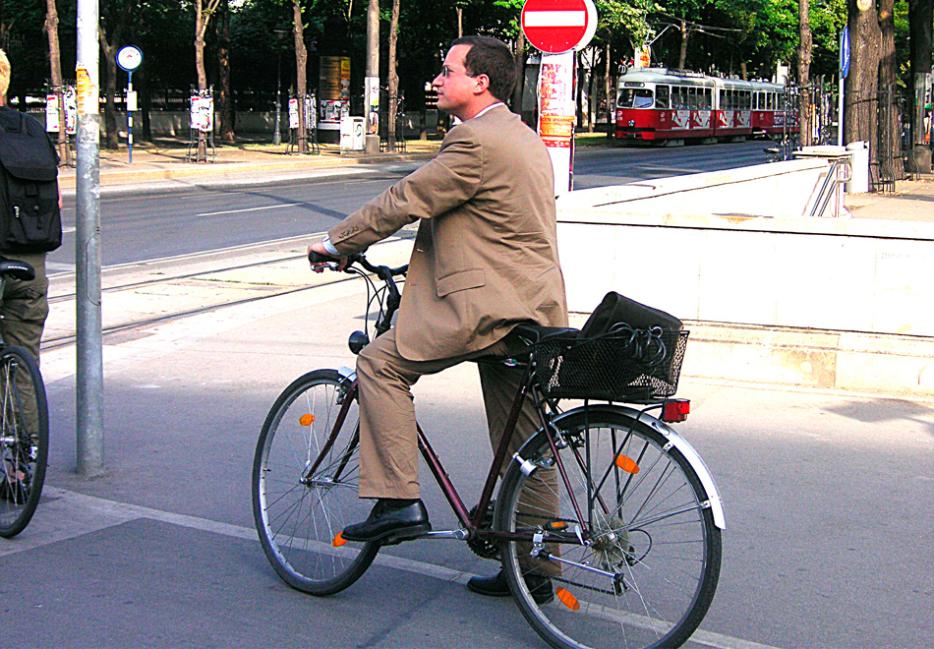It was dusk, in high summer, and the light was fading. I sat at the top of the garden, perched on my yellow Raleigh Striker XL, right pedal raised. My father, who had dutifully held the back of my bicycle those past weeks as I wobbled across the lawn, had gone inside. But as the dark crept in, I pushed my right leg down, and a few seconds later, I had done it. I had ridden a two-wheeled bike across the length of the back yard.
A couple of weeks later, after a quick road test administered by Dad, and I was free to ride my bike anywhere—so that’s just what I did. To the park, to the tennis courts, to the bridge over the train tracks, to the shopping centre, often from dawn until dusk. A bike was life, and cycling was how I chose to live it, free and unconstrained.
And now, apparently, you people want me to ride my bike to work.
This is the demand, is it not? That in response to gridlock, pollution, and obesity, I am supposed to eschew the car and the train in favour of my beloved bike, don my helmet and ride to my job? Well, fuck that.
I will not clip my cleats to go and clock in. I will not pedal for a paycheck. I will not sully my ride in pursuit of a salary. What I will do instead is march upon the powers-that-be and demand one thing and one thing alone: ban the cycle commute.
Do not mistake me. This is not some absurd right-wing reaction to bike-sharing, as if cycling is some socialist plot. Quite to the contrary, this is a cry for the soul of the cyclist, a wail of war against the subsumption of one of life’s greatest pleasures into “the work week.”
Think of the bike as it weaves its metaphoric way through the streets. It traverses the interstitial spaces between the automobile, that carcinogen-spewing symbol of the industrial age gone mad, sneaking through the gaps the car leaves choked with its noxious fumes. While drivers rage as they sit paralyzed in stultifying traffic, the cyclist breezes through, cavorting through the conformity of traffic like a mad whirling dervish.
And now, after such freedom, we are to see our rides bring us to the same destination as Larry and Laila Leadfoot: the office.
To be sure, the bicycle’s symbolic place has for many—feminists, environmentalists, anti-capitalists—been seen as reprieve from the industrial morass of the contemporary. For example, women who were once constrained like the cast of Downton Abbey saw the bike as a tool of personal and political mobility, allowing them to gather without the need for a chauffeur or the harassment suffered on the train.
But if it is okay to ride a bike to work to hide from 21st-century ills, I can only imagine what’s next. Will we thus be doomed to ride solar-powered vehicles to twelve-hour shifts at the SUV plant? Will we buy sweatshop-produced garments to protest consumerism? Will we march thousands-strong for Workers’ Rights, only to surreptitiously slip off along the route, one by one, into our white-collar jobs so that, by the time the public arrives at the town square, there is no crowd to disperse?
To ride a bike to work is to subsume pleasure into the machinations of productivity, to make leisure yet another economic activity. By its nature, the bicycle is anti-productive: it exposes one to the air, shocking you out of your air-conditioned stupor. It lends itself to wandering; after all, find a gentle incline on a sunny day, and the bike practically takes you where it wants. It is a tool for both aimless daydreaming and collective social resistance. Find friends and ride four bicycles wide, blocking the traffic behind you. Where should you go? Why, nowhere, of course; anywhere. When it comes to the bicycle, destinations are akin to domestication.
You can already hear the creeping effects of the taming of the bike: “I feel so much freer than on transit or the car,” says the armour-clad modern cyclist, immune to the way in which the playfulness of the bike has turned into one more cog in an individualist machine in which personal freedom is paramount. How better to explain the corruption of the two-wheeled dream than to claim it allows one to better escape the rest of the clamouring rabble who are also using it to arrive at a slave-wage?
And isn’t this just the problem? All the fields that once provided fertile ground for resistance to the worst of modernity are now becoming their most insidious and effective propagators. Whether music, fashion, art, or rebellion itself, the commoditization of the world means that all the sites that might have once served as loci of refusal are now simply ways you, yet again, say yes to the way things are. You can no longer ask whether you can use the master’s tools to dismantle the master’s house, because everything you do helps build it. And the bicycle commute is the apotheosis of this process of assimilation, late capitalism’s most injurious triumph made manifest in the image of dress pants tucked neatly into socks.
When New York recently instituted its bike-sharing program, Wall Street Journal editor Dorothy Rabinowitz went on a delightfully absurd, crackpot rant insinuating that bike-sharing was part of some awful, totalitarian plot. We scoffed, but now I see that she was inadvertently right: it’s just that it’s the suits riding their Citibikes and Bixis to the financial district who are the foot soldiers of this particular revolution.
Still, we are not altogether in chains. We can still make choices for a better world. We can still remember what it is like to coast through the thick air that hangs low on empty city streets late in the summer night. We can still gather and form a critical mass, riding in a circle for the simple reason to proclaim that we are here. We can still recall what it is to ride without purpose, from one end of the garden to the other, and from one side of the city to another, too. We can take a stand, and say that we will not relent. We will take no more. We will only do what is right and ban the cycle commute.






